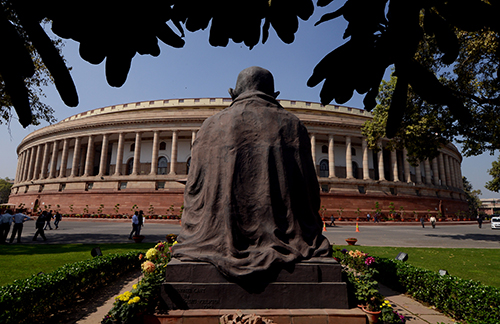An online campaign to decriminalize defamation in India is being led by a member of the country’s main opposition party. “Criminal defamation can lead to people being put in jail for something they have said publicly. This law needs to be replaced by a modern, progressive law,” reads the statement on the campaign website.
The campaign, set up last month by Tathagata Satpathy, of the Biju Janata Dal party, along with journalists, lawyers, and public policy professionals, is the latest attempt to decriminalize a law created in the 19th century.
Sections 499, 500, 501, and 502 of India’s penal code stipulate a two-year jail term if a person is found guilty of defamation either via text, speech, or visuals. Previous attempts to strike the law from the books have failed. In a chunkily-worded judgment in May, India’s Supreme Court ruled that criminal defamation will remain on the statute books, saying, “‘Reputation’ of one cannot be allowed to be crucified at the altar of the other’s right of free speech.”
It is now up to India’s Parliament to pass a law to decriminalize free speech.
Satpathy will introduce a Protection of Speech and Reputation Bill in the winter session of Parliament that seeks to repeal the outdated law. “Our idea is to create a mechanism for just, speedy, and effective implementation of a law against defamation, while safeguarding our cherished right to free speech,” he said in a statement on the campaign website. Because defamation will remain a civil offence, the authors of the draft bill are including provisions to ensure that it can’t be abused in civil courts.
In India, criminal defamation has been used by politicians, corporations and powerful individuals to harass reporters, editors, newspapers, and magazines. It is rare for a journalist to be convicted under the law but the thought of enduring a costly, grueling legal process is enough for many to exercise “excessive caution,” said Siddharth Varadarajan, former editor of the leading English-language daily, The Hindu. Varadarajan said he has had criminal defamation cases filed against him and the paper for stories published while he was at the helm. Two were filed by J. Jayalalithaa, a former chief minister of Tamil Nadu state, over pieces critical of her that were published in 2012 and 2013. In another case, Asaduddin Owaisi, president of the All India Majlis-e-Ittehadul Muslimeen party, filed a case against Varadarajan and The Hindu in 2012, for running a piece that alleged Owaisi had secretly met a member of the Congress party.
Because of India’s backlogged legal system, all three cases are still pending. “These hang like the proverbial sword of Damocles over my head,” he said. “They can be revived at any time, summons can be issued at any time, and I’m dependent on the goodwill and efficiency of The Hindu‘s lawyers to keep me out of trouble.”
Often, before a case is filed against a journalist lawyers send an advance warning. “The very threat of a defamation case ends up putting the editor and promoters [of the media company] on a cautionary tale and they will not pursue the story,” said Josy Joseph, editor of special projects at The Hindu. When Joseph was at the Times of India in 2015, Anil Dhirubhai Ambani Group, one of India’s biggest industrial houses, served him and the paper a notice demanding they withdraw reports that alleged discrepancies had been found in the accounts of a power supply company that the group owns, stop publishing stories on the subject, and to apologize. The legal notice said that if the demands weren’t met, Joseph and his employer would have to collectively pay Rs 50 billion dollars (US$748 million) in damages. “The immediate impact was that the coverage ceased,” Joseph said.
Once court proceedings commence is when the real harassment starts. India’s lower courts can often be crowded and sweaty, and are generally in remote areas, which makes travel a cumbersome experience. Being granted an exemption from personal appearance in criminal defamation cases is a rarity. “I once accompanied a legendary editor who had to appear in Delhi’s Patiala House courts in a defamation case,” Joseph said. “We reached there in the morning, around 9 a.m. This was at the height of summer with temperatures going to 42C [107.6F], he was an old man and it was a crowded courtroom with no air-conditioning. At about 2.30pm, the judge’s clerk says, ‘The judge isn’t keeping well and isn’t there today.’ That’s it. Your day is gone and you’re harassed.”
While media conglomerates like The Times of India are more likely to be able to bear the cost of such cases, for small and medium-sized outlets, legal costs can be prohibitively expensive. As a result, owners and editors will often retract stories and take the “safer bet for ensuring that they survive for another fight,” said Joseph.
Rajesh Mascarenhas, chairman of the Mumbai Press Club who supports the campaign to decriminalize defamation, said, “The constitutional right to freedom of speech has been restricted by the politicians or affluent people with the defamation weapon.” He added,
“Decriminalization of defamation would pave the way for journalists and also the alert citizens to speak out or bring out the serious accusations of corruption and the integrity of all these politicians, government officials, and others.”
Satpathy plans to introduce the draft legislation as a Private Member’s Bill—legislation proposed by a member of parliament who is not a minister—but past legislative precedent isn’t on his side. According to data collated by PRS Legislative Research, an independent organization that monitors Parliament, only 14 private members’ bills have been passed in Independent India. However, Satpathy and his supporters have reason to be optimistic. The last private member’s bill voted into law was in 2014, when Parliament passed the Rights of Transgender Persons Bill. Satpathy and his supporters can only hope that his colleagues in Parliament will now be willing to defend the rights of journalists and freedom of the press.
[Reporting from New Delhi]
